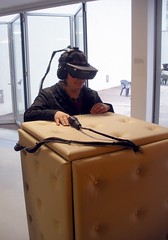September 06, 2011
I'm in the experience machine today
 Or rather, my voice might be heard 21.00 on BBC4's radio program "The Philosopher's Arms", where I am one of the regular barflies.
Or rather, my voice might be heard 21.00 on BBC4's radio program "The Philosopher's Arms", where I am one of the regular barflies.
Last evening we discussed Nozick's experience machine and what that told us about happiness, and whether governments could help make us happy. We have a survey up on Practical Ethics about related questions: The Experience Machine: A Survey
One of the big problems with pursuing happiness (besides that it might not be the goal in the first place and we tend to become unhappy if we pursue it too strongly) is that we are so bad at doing what makes us happy.
One of my favorite papers on the topic is Christopher K. Hsee and Reid Hastie's "Decision and experience: why don't we choose what makes us happy?" Trends Cogn Sci. 2006 Jan;10(1):31-7. They review the evidence that we 1) often fail at predicting future experience accurately, and 2) fail at follow our own predictions.
Some rules of thumb I have derived from the paper:
You will not feel as joyful or bad as you think you will feel about a future event. That gizmo will not make you enormously happy even if it is really good, and a big personal failure will not feel as bad as you think it will. Dreading something is usually worse than the thing itself, and it will often last longer.
Don't shop when you are hungry We project our current state into the future and onto others (and the past: we do not remember things as they were but as we are). This makes us buy more food when hungry, even if we are going to eat it at some point when we are not hungry. Before going out drinking we are soberly considering whether to take the car or not, but at the point in time when we decide whether to drive home we are not sober.
If you cannot make up your mind about alternatives, just choose one randomly: they are about equal. We tend to overdo comparing minuscule differences between choices that do not matter. This is especially true for quantitative differences, which often overshadow more important differences like what you want the thing for.
Hard numbers are not hard evidence. Numerical evidence looks impressive but can be misleading, uncertain or plain wrong. Especially about what makes us happy: it is not the size of the monitor that matters but whether it fits my desk, it is not the exact reviewer score but whether the reviewer thinks like me that matters.
Leave the party just after it peaks. We remember the pleasure or pain of something based on the peak intensity and how it was at the end. So if you do something unpleasant, make sure it trails off.
Don't trust lay theories of "how things are". We often overgeneralise from the cases where we learned them.
Don't trust standard rules like "don't waste", "seek variety", "don't pay for delays". Just like lay theories they have their domains of applicability - learn them, but do not expect the rules to always work. Today it is better to throw away excess food that fall for unit bias and become obese. If you really like something you do not need to try variants just because.
Don't pile on options. The confusion, excessive comparisons, contrast between them etc. will make things feel worse.
We are often too impulsive, but not always. Learn how to maintain the right kind of long-term outlook: don't sacrifice long-term happiness for short-term pleasure, but don't expect to become happy because you are long-term.
Don't mix up the instrument with the goal, the medium and the reward. We tend to think the expensive thing is better than the less expensive. We often maximize the medium rather than the aimed for experience: we often acquire more money than we need to get what we want, because the money (the medium) reminds us of the reward.
These are things we can train. Not always easily, but it is doable. We can become better at being happy.
Posted by Anders3 at September 6, 2011 05:49 PM